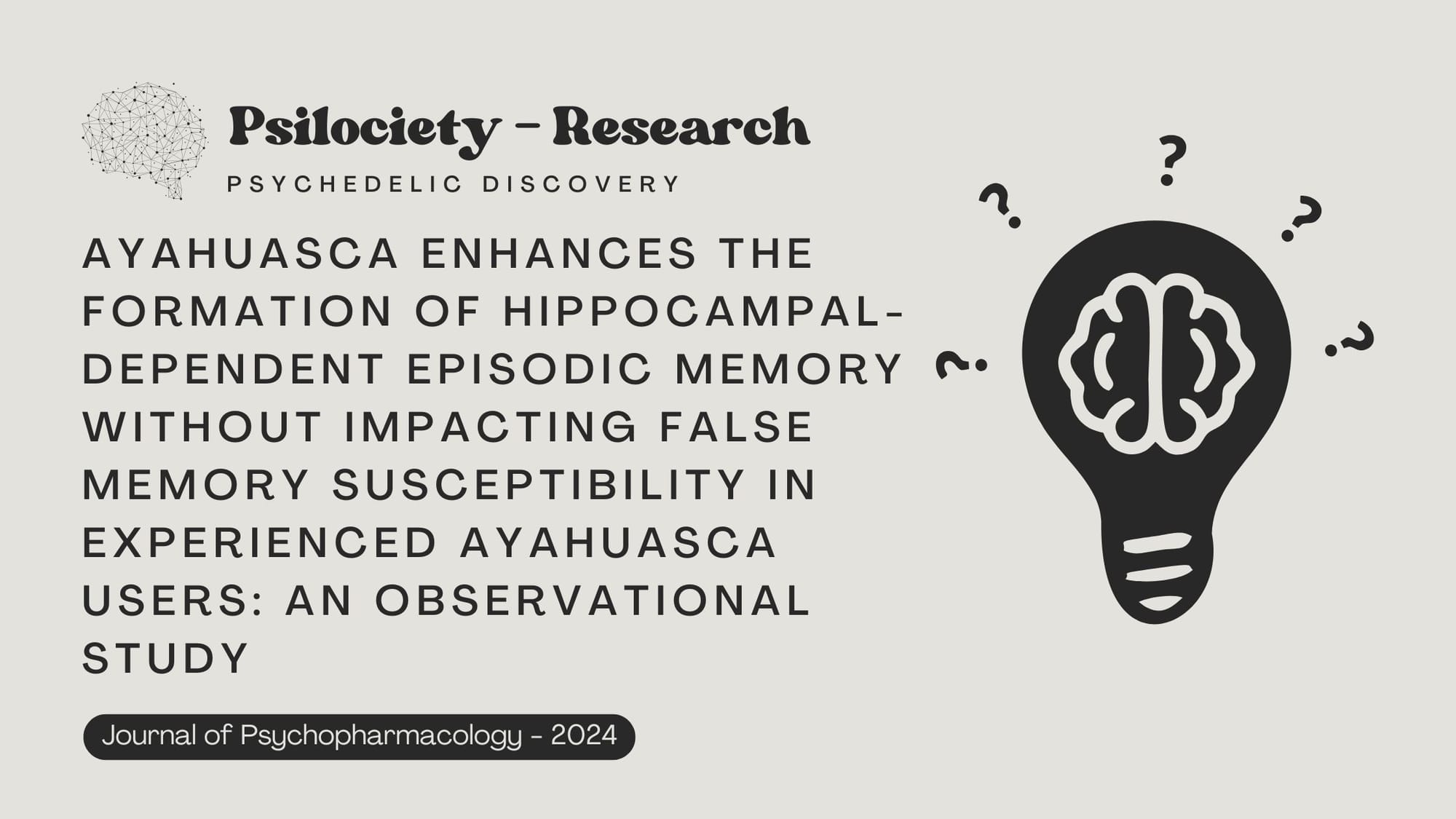Ayahuasca enhances the formation of hippocampal-dependent episodic memory without impacting false memory susceptibility in experienced ayahuasca users: An observational study
The study aimed to explore how ayahuasca affects episodic memory and susceptibility to false memories among long-term users.

Title & Introduction
- Paper title: Ayahuasca Enhances the Formation of Hippocampal-Dependent Episodic Memory Without Impacting False Memory Susceptibility.
- Published In: Journal of Psychopharmacology, 2024
- Authors: Manoj K. Doss, Lilian Kloft, Natasha L. Mason, Pablo Mallaroni, Johannes T. Reckweg, Kim van Oorsouw, Nina Tupper, Henry Otgaar, Johannes G. Ramaekers
- Objective: The study aimed to explore how ayahuasca affects episodic memory and susceptibility to false memories among long-term users.
Summary & Takeaways
Key Takeaway: Ayahuasca enhances episodic memory formation without increasing false memories, suggesting unique effects of its polypharmacology on the brain.
- Practical Application: Future studies should explore β-carbolines as adjuncts in psychedelic therapy to mitigate memory-related side effects.
Key Background Information
Context: Ayahuasca, an Amazonian psychedelic brew, contains DMT and β-carbolines, with known psychoactive effects mediated via 5-HT2A receptor activation. While psychedelics often impair memory encoding, ayahuasca's unique pharmacology, including potential hippocampal neurogenesis, might enhance episodic memory.
Hypothesis: Researchers hypothesized that ayahuasca would impair true memory encoding and increase susceptibility to false memories during acute effects.
Key Findings
Memory Performance:
- Ayahuasca enhanced recollection-based memory, evidenced by:
- Increased hit rates and accuracy.
- Improved high-confidence accuracy.
- No increase in false memory susceptibility despite acute drug effects during retrieval.
Specific Impacts:
- Recollection (hippocampal-dependent memory) improved significantly.
- Familiarity (cortical-dependent memory) remained unchanged but was elevated across conditions.
No Metamemory Changes:
Participants’ ability to judge their memory accuracy (metamemory) was unaffected.
Interpretation & Implications
Conclusion: Contrary to typical psychedelic effects, ayahuasca enhanced episodic memory in long-term users without increasing false memory susceptibility. These findings challenge the assumption that psychedelics universally impair memory encoding.
Implications:
- Therapeutic Applications: Ayahuasca's potential for improving memory processes could be beneficial in therapeutic contexts, particularly for individuals with memory impairments.
- Role of β-Carbolines: The β-carbolines in ayahuasca might counteract memory impairments associated with psychedelics, suggesting avenues for optimizing therapeutic psychedelic use.
Limitations:
- Lack of a placebo control group.
- Results may not generalize to inexperienced users.
- Practice effects (participants learning the task) could partially explain memory improvements.
Researchers & Publication
- Researchers: Manoj K. Doss, Lilian Kloft, Natasha L. Mason, Pablo Mallaroni, Johannes T. Reckweg, Kim van Oorsouw, Nina Tupper, Henry Otgaar, Johannes G. Ramaekers
- Publication: Journal of Psychopharmacology
- URL: https://doi.org/10.1177/02698811241301216

